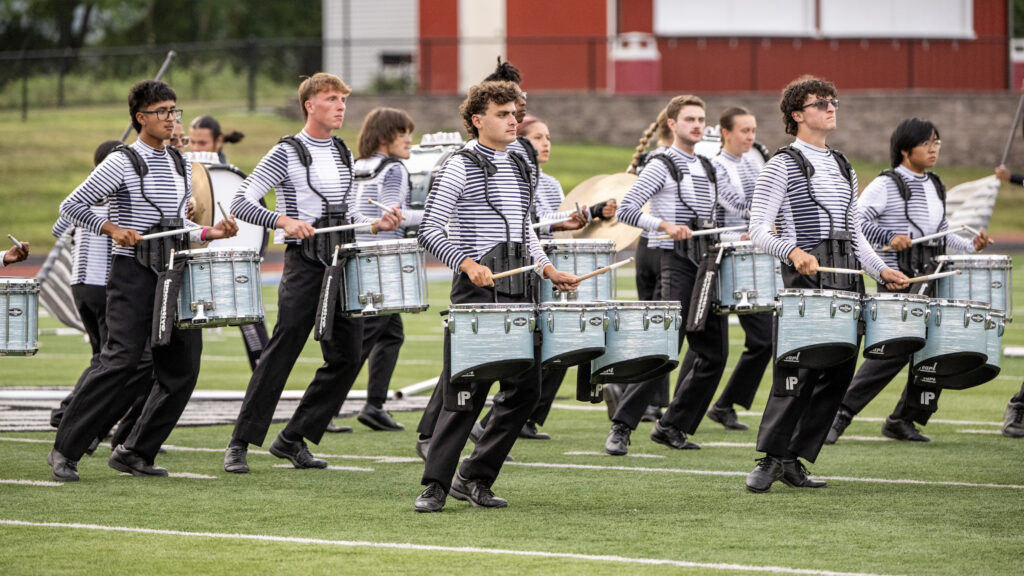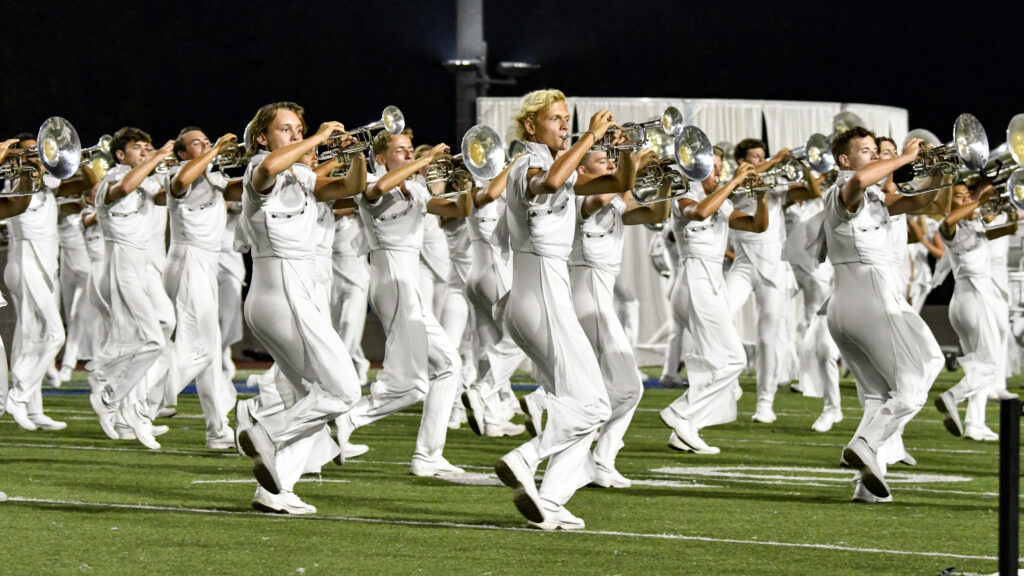I had the honor of working on a large variety of interviews and articles for DCI.org during the past season, allowing me to meet and talk with dozens of marchers. I was constantly amazed at the love and dedication of those who give so much time and effort so that we may enjoy this great activity.

The following are just a few snippets from some of those DCI.org interviews that most captivated and touched me. The bet Andy Perdzock of DePere, Wis., at 13, is the youngest member of the Americanos. His father, John, aged out of the Blue Stars in the late 1970s and now marches with the Kilties senior corps. Both corps performed Saturday night at the DCI Midwest Championship in DeKalb, Ill., after scoring within one or two points of each other most of the season. Both John and Andy stepped into marching a corps this year. According to Andy, “After the Racine Scouts show on July 5, my dad came up to me and said he was making a bet with me, and to ask Dave Svaleson, operations director, about what it’s about. So I asked Dave, and he said the bet was if we beat the Kilties at DeKalb, my dad would do dishes for the entire year, but if they beat us, I would still have to do dishes for the year. At first I was excited, as no one wants to do dishes. But after that, I started telling everyone about the bet. Right now I’m thinking I won’t have to do dishes for the year, but I won’t know for sure until tomorrow night.” Follow-up: The bet was that the member of the lower-scoring corps would have to wash dishes for the entire year. Both father and son upped the bet during a Saturday meeting to include taking out the garbage for the coming year. Americanos scored 51.10 on Friday night. Kilties scored 48.35 on Saturday. It looks like Andy will have it easy for the coming year. What drum corps does for the marcher Josh Wennes is a contra player for the Decorah Kilties. “This is my first drum corps experience, as I’m a first year member. Having the pressure put on me here at the big show [in DeKalb] is an experience in itself. Being in a corps molds one better as a person, giving you the experience of meeting new people and learning how to work together with those people as a team. I think everyone should try it.” Nine years of no regrets Drum major Jillene Sturgess is aging out of the Mandarins after marching nine seasons with the corps. Her first season was 1994, when the corps had only 35 members and ten in the horn line. She picked up a baritone because the corps needed horn players, and spent seven years on the instrument. “This year, the stories of each person in the corps came flooding back. I’ll remember a story from years ago when I look at someone and I’ll get this overwhelming adrenaline rush. I take a deep breath and realize I have no regrets for giving as much time as I have to the corps, that all my years were spent doing something I enjoy.” It’s not about me Dan Merwin is a second-year bass drummer for the Madison Scouts and comes from McAllen, Texas, a city way down in the Rio Grande Valley. “I’ve become a much better person doing corps. I’ve learned that I’ve pretty much dropped most of my selfishness. It’s not about me, it’s about us. We rely on each other. If one person doesn’t do his job, he’s letting everyone down. It’s teaching us about responsibility.” All about the experience Jon Bunner is a third-year bass drummer with Carolina Crown. He hails from Denton, Texas, and goes to school at University of North Texas, where famed corps arranger/instructor Paul Rennick runs the drum line. “It’s an experience all its own. What else can you do in your life where you pay to have someone tell you what to do for so many months of the year, but you also love to do it? It’s all about the experience in drum corps … the lifestyle, the people.” A sense of family Ray Laffoon plays marimba in the Cavaliers. This is his second year in the corps. Ray’s dad is in the United States Air Force, and as such, Ray had seen quite a bit of the country even before joining the corps. Ray remembers, “I was born in California, moved to Louisiana, moved back to California, went to Guam, then Texas, Alabama, Germany, and then Hawaii, where my parents live now. Drum corps has given me a sense of family, one thing to come back to no matter where I live.” To Florida in school buses Ray Payne, Jr. is the music director for the Kingsmen, from Joliet, Ill. He informed me in DeKalb that the corps’ budget for the year is about $5,000, a remarkable sum, even for a small corps. Parents kick in much of the rest and the entire staff is volunteers. But the mission of the corps, as stated by Ray, is just as remarkable. “The basic program is intended to help kids from the inner city expand their knowledge and adjust their behavior and outlook on life.” Fast forward to Orlando: Ashton Conway is the Kingsmen’s drum major and is a first year member of the corps. He’s only 11 years old. “Travel is great. We took two school buses down here from the Chicago area. [Parents prepared meals at the rest stops.] It was hot. We burned up a bit but we passed the time by playing on the bus. [Members were thrilled to be in Orlando. When solicited, no one would complain about the bus trip.] Life changing Michael Grasty is an age-out in Phoenix’s guard. “Drum corps broke me down and rebuilt me different. I’m so much stronger now in every way.” Don’t sweat the small stuff Bobby Romero is a snare drum rookie in the Raiders. “Drum corps means permanent friendships, trusting in other people and holding confidence in myself. I joined corps to learn something new. I’ve learned how to live with others for three weeks on end. I’ve learned how to let smaller problems go away and to focus on the bigger things.” From nothing to something Michael Marks is Scenic City’s drum major and is in his first year of marching. “Drum corps teaches self-discipline and integrity and how to reach a goal and go beyond the breaking point. When times are down, it teaches people how to push harder to go on to the next day and work twice as hard to reach a goal. It teaches one how never to give up. “There are kids who don’t know how to do their own laundry and drum corps teaches them that responsibility. They’ve got to learn from the get go, plus they have to learn how to hang up their uniform. Some kids don’t know how to hang up their clothes. They just throw stuff on the bus all wadded up. They soon learn that it’s not their uniform, it’s the corps’ uniform. “I see kids learn basic information about playing their horn or drum or how to do guard, and it’s fascinating to see them make progress and go from nothing to something.” Heroic kids I wish to end with two full-length interviews conducted during the morning of the I&E event in Orlando. No doubt, all the kids that participate in drum corps are amazing … giving up their summers and sticking with the activity through sunburn, long rehearsals, and sometimes primitive living conditions. The following two kids go beyond amazing. They are heroes. Their stories deeply touched me and deserve further exposure. I was stunned that Raymond was able to march a guard with his condition, and when Shaylee explained why she was marching the year of her 15th year on the planet, I literally had to temporarily stop the interview. I could not type, nor could I see the keyboard. Their spirit and dedication is an inspiration for us all. Not looking ‘back’ Raymond Okuda is a second-year member in Phoenix. The resident of Elizabeth, N.J., is marching despite a disability that would put many others out of commission. Not only does he march, he marches in the guard, an unusual position for someone with two foot-long steel rods in their back. As Raymond tells it, “I have two foot-long steel poles attached to my spine with hooks and wires. Most of my vertebrae are fused together in one solid bone. I’ve had scoliosis for most my entire life and it’s been tracked by doctors since I was in elementary school. Scoliosis is curvature of the spine. My back is shaped like an ‘S.’ “I had a scoliosis spinal fusion was I was 16. The doctors straightened out my spine and fused the vertebrae together and attached the two steel poles to keep everything in place. “Most people who have the disease have a deformation. People who have the surgery lose a lot of their flexibility and range of motion. I was lucky with mine, because I still can bend a lot. I still have most of the flexibility I had before the surgery. “After surgery, I was given a list of things I’m not allowed to do, such as bungee jumping and skydiving. If something breaks, there’s an additional two-year recovery process and I would have to start over. “As for being in the Phoenix guard, I’m on flag and rifle. The instructors try to write the work so it doesn’t put too much strain on my back. Sometimes, there are things I can’t do, so the work either gets rewritten or I sit out. They’ll work out a transition so I exit gracefully. I’m OK with that and I do what I can. “I’ve yet to meet anyone else in drum corps who has scoliosis. I try to compensate for my disability and make it as little a problem as possible. You can’t help the cards you’re dealt and you’ve just got to work with them. “To others having physical difficulties, I would encourage them to just push through it. It might seem hard and frustrating at first, but if you push through it, it won’t be so hard and difficult. Don’t be afraid to go for it. If you want to do it bad enough, there’s a way to do it.” Looking forward to another year Shaylee Young is a 15-year-old from Winterset, Iowa, who has overcome tremendous odds to fulfill her dream of marching in a corps. The Blue Stars’ rookie baritone is a cancer survivor. Hers is a story of incredible determination and will. “I had stomach pains since December. The doctors had no clue as to what it was. Through ultrasound tests, it was discovered that I had a nine-centimeter ovarian cyst, about the size of a small orange. Cancer runs in my family. I’ve lost at least five family members on both sides. “I was diagnosed with cancer when I was 10 and was told I wouldn’t live to be 15. Besides that, I wasn’t told much. My health had been going down, so I figured I would do stuff while I could. That’s why I’m marching this summer. It’s the summer after I turned fifteen. I figured ‘whatever happens, happens,’ so I wouldn’t let it get me down. “The cyst was removed on March 4 and a biopsy was taken. Fortunately, that one was benign. I have ovarian cyst disease, so there are others that might have to be dealt with. One ruptured and took me out of the corps’ home show in LaCrosse, Wis., because my side hurt so bad. The doctors said I had fluid in my body that would have to be reabsorbed, and until it was reabsorbed, it would be painful. But I was back practicing the next day. “The tour has been interesting. When I had my surgery, I were told I couldn’t pick up anything over 10 pounds for six weeks. The Blue Stars camp was seven weeks after my surgery. My horn weighs eight pounds, and it gets heavy when you have to hold it up and out for so long. “I’ll sit out for awhile when my stomach hurts, and when I run back in to the rehearsal, the corps members encourage me to keep going. “The doctors will see what my health is like when I go home, and then I might be starting chemotherapy. “I’m looking forward to having another year where I can accomplish anything and overcome any obstacle. To others with challenges, I encourage you to not let things get you down. No matter what, you can overcome it.”
Michael Boo has been involved with drum and bugle corps since 1975, when he marched his first of three seasons with the Cavaliers.
He has a bachelor’s degree in music education and a masters degree in music theory and composition.
He has written about the drum corps activity for over a quarter century for publications such as Drum Corps World, and presently is involved in a variety of projects for Drum Corps International, including souvenir program books, CD liner notes, DCI Update and Web articles, and other endeavors. Michael currently writes music for a variety of idioms, is a church handbell and vocal choir director, an assistant director of a community band, and a licensed Realtor in the state of Indiana. His other writing projects are for numerous publications, and he has published an honors-winning book on the history of figure skating. His hobbies include TaeKwonDo and hiking the Indiana Dunes. But more than anything, Michael is proud to love drum corps and to be a part of the activity in some small way, chronicling various facets of each season for the enjoyment of others.





